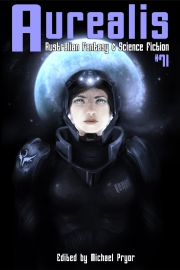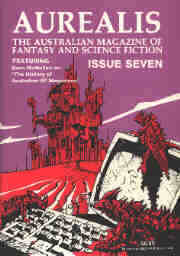Aurealis #144
$3.99
Aurealis 144 is bursting at the seams with speculative fiction wonders, from the mysterious encounters in Devil-May-Care by Michael Gardner, the quirky and ingenious Ask Bernard by Greg Foyster to the subtle and well-crafted worldbuilding of Pygmalion by J D Moyer. Our compelling non-fiction includes an interview with writer G R Matthews plus Lachlan Walter’s timely investigation of Indigenous Australian Science Fiction. Of course, we always have a huge Reviews section and our internal artwork is second to none. Aurealis—a gift from the gods.
- From the Cloud — Dirk Strasser
- Devil-May-Care — Michael Gardner
- Ask Bernard — Greg Foyster
- Pygmalion — J. D. Moyer
- Indigenous Futurism and Indigenous Australian Approaches — Lachlan Walter
- Dying for Answers with G R Matthews — Chris Foster
Have you ever had one of those conversations? Where the person finds out you’re into fantasy and science fiction and they say that, although they love the Game of Thrones series, they would never read a fantasy book.
I’ve had that conversation recently.
What do you say to that?
I asked her why.
Her response was revealing. She was obviously well-read, mentioning that she usually read the Booker prize winner after it’s announced. She waffled a bit about the reason for not reading fantasy, but it ultimately came down to that it’s not literature. She obviously wanted people to know she read Booker prize winners, but never fantasy.
I read because I enjoy it. It’s fairly simple. If I like something I’ll continue with it and seek out other books by the same author. If I don’t like it, I stop reading. I haven’t read a lot of Booker prize winners as a result.
I’ve come to the conclusion that a lot of people read for a different reason. They read to impress others. They read to be able to tell other people what they’ve read. They read to boast.
Outside the speculative fiction community, you usually don’t get any brownie points for saying you read fantasy. It often gets dismissed, trivialised, even mocked.
And yet Game of Thrones was the most watched series of all time. (Stranger Things and The Walking Dead were two and three.)
So there are a lot of people who are happy to say they watch speculative fiction, but not read it.
Which brings me to a quote from the writer, producer and creator of another series that makes it into the top 15 most watched series of all time—and one of my other favourites: Vikings.
I’ll quote him in full. Michael Hirst says,
‘People hate me for it in a way, but I do draw this distinction between Game of Thrones and Vikings. Because Game of Thrones is a fantasy, anything can happen, so people can come back to life and dragons can fly. I’m not saying it’s bad, it’s great, very accomplished. Because anything can happen, it’s actually meaningless. It doesn’t obey any of the laws of geography or biology or anything, and I’m very proud of the fact that Vikings is real, at least it’s based on real people and real events. We make it as real as we can. We don’t use much greenscreen. Our actors actually drag boats up hills, row and fight, so it’s a very real undertaking.’
Don’t get me started on the naivety of what he’s saying here!
Okay… I can’t help it. I’m going to get started.
Michael Hirst should be proud of his series, but he should be ashamed of his boastful lack of understanding about fantasy. The ‘anything can happen in fantasy’ bit is gob-smackingly ignorant of what it takes to build a consistent fantasy world, create characters and structure a plotline within it. How easy is it in comparison to base it on existing geography, biology or historical figures! What’s more meaningless: retelling a story that already exists, or creating something new?
And he doesn’t even realise that, with its merging of Norse mythology and mysticism with historic facts, Vikings is a classic fantasy. The fantasy elements are a key to its success. Well done, Michael Hirst. You’re one of us, and you don’t even know it.
All the best from the cloud!
Dirk Strasser
From Devil-May-Care by Michael Gardner:
It wasn’t easy being friends with Harrick Asmodeus. It was harder working for him. His best years were behind him—and I mean well behind him—but there was no convincing Harrick he was finished. More than talent, more than the connections he’d made, the thing that had taken him to the top was a laser sharp sense of entitlement and self-belief. It was his superpower.
From Ask Bernard by Greg Foyster:
Alternative: I should have used my special power to become a Great Man, a world leader, rather than just the undisputed quiz champion of the Anglosphere. Emotion associated with wishing one had made different choices? Six letters, begins with R.
From Pygmalion by J. D. Moyer:
Someone knocked on the cabin door, loudly and insistently.
‘Professor Daniels, Skipper wants you!’
The accent was Filipino. Paix Daniels opened the door to see Cedric, his official ship liaison.
From Indigenous Futurism and Indigenous Australian Approaches by Lachlan Walter:
The ramifications of the British Empire’s colonisation of the wider world are still being felt, and nowhere is this more evident than in its English-speaking former colonies: America, Australia, Canada and New Zealand. Disparities in general health, mortality rates, educational opportunities and gainful employment; systemic and endemic racism; paternalistic attitudes entrenched in the governing political and economic systems; disdain for their traditional cultural practices, and traditional ways of life; issues of substance abuse, caused in part by a loss of identity and dispossession of their lands; forced assimilation and the erasure of their history, both overtly and covertly—all still effect many indigenous peoples of these countries, especially those living traditional lifestyles and/or inhabiting their remaining ancestral lands (which typically tend to be located far from each country’s cities and seats-of-power).
From Dying for Answers with G R Matthews by Chris Foster:
Between teaching creative writing, living out his fantasies through D&D, singing (possibly too strong a word for it) his stories while playing guitar and training to be the party tank by being thrown around during martial arts, G R Matthews has turned his hand to yet another narrative artform: fantasy novels.
With his first traditionally published book Seven Deaths of an Empire (2021) now on bookstore shelves, he agreed to be interrogated in the hope of rolling a successful persuasion check with our readers.





